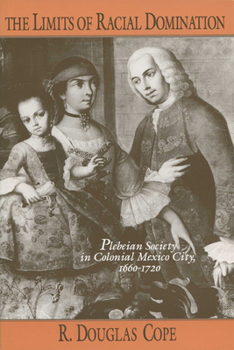The Limits of Racial Domination: Plebeian Society in Colonial Mexico City, 1660-1720
Select Format
Select Condition 
Book Overview
In this distinguished contribution to Latin American colonial history, Douglas Cope draws upon a wide variety of sources--including Inquisition and court cases, notarial records and parish... This description may be from another edition of this product.
Format:Paperback
Language:English
ISBN:029914044X
ISBN13:9780299140441
Release Date:April 1994
Publisher:University of Wisconsin Press
Length:232 Pages
Weight:0.75 lbs.
Dimensions:0.6" x 6.0" x 9.1"
Customer Reviews
2 ratings
Thorough account of a troubling aspect of Mexican history
Published by Thriftbooks.com User , 22 years ago
Cope provides a meticulous and empirically well-founded exploration of the physical and social conditions in late colonial Mexico. His study considers both the efficacies and inefficacies of a caste system that required an exact distribution of rights, privileges and obligations along racial lines. The result is an account that not only establishes the ways in which race constrained the life opportunities of individuals in colonial society, but also the ways in which the characteristics of this system were manipulated by those in power and by those seeking upward mobility. While the European elites used phenotypic qualities to separate themselves from the rest of the Mexican masses, those with aspirations of moving up the social ladder could do so through intermarriage, economic success or other status-enhancing methods. Particularly important is Cope's investigation of the patron-client relationship. In effect, because the most disadvantaged portions of society relied on the elites (their employers and landlords) for survival, it was impossible for these lower castes to rebel against the system and sustain themselves at the same time. Such a circumstance kept the masses in check and elite power secure. In many ways the patron-client dynamic, and the caste system on the whole, still characterize Mexican society today.
Well executed and much necessary study
Published by Thriftbooks.com User , 26 years ago
Well executed and much necessary study






